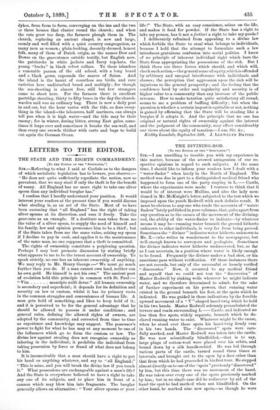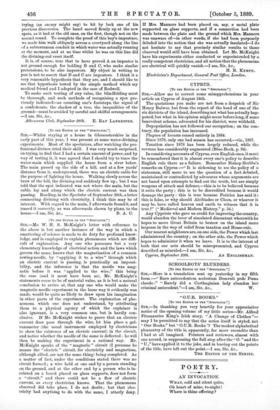THE DIVINING-ROD.
[TO THE EDITOR or TEE " SPECTATOR."1 SIR, —I am unwilling to trouble you with my experience in tkis matter, because of the avowed antagonism of our re- spective opinions in regard to such subjects. At the same time. I should like to inform your readers how I dealt with a " water-finder " when lately in the North of England. The method was due in part to a distinguished medical friend who happened to form one of the party staying in L— Castle, where the experiments were made. I venture to think that it would be of interest were Mullins, and also the lady men- tioned in Mr. McKnight's letter, subjected to the test which we imposed upon the youth Rodwell with such definite result. It must be obvious to any one who reads the accounts of " water. finders " lately published in your columns, that, quite apart from any question as to the causes of the movement of the divining- rod, the ability of the water-finder to indicate—by whatever means it may be—running water beneath the ground hitherto unknown to other individuals, is very far from being proved. Sometimes the " diviner " indicates water hitherto unknown to Mr. X—(who writes in wonderment to the newspapers), but well enough known to surveyors and geologists. Sometimes the diviner indicates water hitherto undiscovered, but, so far as I can ascertain, in a position where water is likely enough to be found. Frequently the diviner makes a bad shot, or his assertions pass without verification. Of these instances there are not records, but only of the successful or loosely verified " discoveries." Now, it occurred to my medical friend and myself that we could not teat the " discoveries " of Master Rodwell by sinking wells wherever he might indicate water, and we therefore determined to admit, for the sake of further experiment on his powers, that running water existed in the ground beneath his feet, at the spots which he
indicated. He was guided in these indications by the forcible upward movement of a " V "-shaped hazel-twig which he held in his two hands. Master Rodwell solemnly perambulated the
terrace and roads surrounding L— Castle, and indicated no less than five spots, widely separate, beneath which he de- clared running water to exist. Whatever might be the cause,
when he stood over these spots his hazel-twig firmly rose in his two hands. The " discovered" spots were care- fully marked, and Master Rodwell was taken into the castle. He was now scientifically blindfolded,—that is to say, large plugs of cotton-wool were placed over his orbits, and bound down by a silk handkerchief. He was led through various parts of the castle, turned round three times at intervals, and brought out to the open by a door other than
that from which he had proceeded in his first tour. He stepped
almost directly on to one of the "spots " previously " discovered" by him, but this time there was no movement of the hazel. He was taken over every one of the spots previously marked by him ; but in no single case did he rediscover by aid of the hazel the spot he had marked when not blindfolded. On the other hand, he marked nine new spots,—as though he were trying (an enemy might say) to hit by luck one of his previous discoveries. The hazel moved firmly up at the new spots, as it had at the old ones, on the first, though not on the second round. To complete the proof of this boy's imposture, we made him walk obliquely across a courtyard along the line of a subterranean conduit in which water was actually running at the moment, and at no time whilst he was on this line did the divining-rod erect itself.
It is, of course, true that to have proved A an impostor is not ground enough for holding B and C, who make similar pretensions, to be also impostors. My object in writing to you is not to assert that B and C are impostors. I think it a very reasonable hypothesis that they are, and I should like to see that hypothesis tested by the simple method which my medical friend and I adopted in the case of Rodwell.
To make such testing of any value, the blindfolding must be thorough, and such methods of recognising a spot pre- viously indicated—as counting one's footsteps, the signal of a confederate, the shadow of a tree, the inequalities of the ground—must be avoided by careful and skilful arrangements. —I am, Sir, &c.,
Athenaeum Club, September 28th. E. RAY LANKESTER.







































 Previous page
Previous page